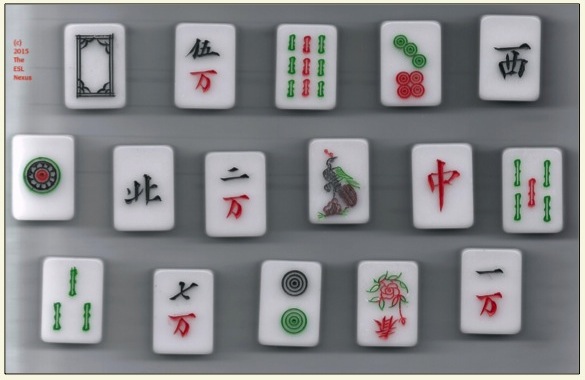Another Chinese family also made me feel welcome and I spent many an evening at their home playing mahjongg or just enjoying a delicious home-cooked dinner. They were a multi-generational family: great-grandmother (whose feet had been bound when she was younger, and it was rare to see that when I was in China), grandfather and grandmother, daughter and son-in-law, and granddaughter. Because not everyone in the family spoke English, spending time with them was a great opportunity for me to practice my Chinese.
 |
| Mahjongg tiles; source: The ESL Nexus |
But because I was there to teach English, I felt obligated to use English as much as possible at the university, although shopkeepers and other workers didn’t know the language and that also gave me a chance to develop my Chinese skills. (The university campus was actually a small town with shops, a market, an elementary school, a bank, and a post office on the tree-shaded grounds.) And whenever I went outside the campus, I spoke Chinese. When I left China two years later, I felt I was at an intermediate level of proficiency in speaking Mandarin.
I really do believe that being able to speak another language helps a person understand and relate to that society much more. I internalized a lot of Chinese cultural characteristics, such as how to accept a compliment, how to offer and accept food, the concept of face, and the concept of guangxi, which is about helping people do things with the hope that they will reciprocate in the future if a favor is ever needed.
You don’t lose one culture when you learn the language of another. Rather, you gain a second culture. This is why researchers and educators working in the field of teaching English Language Learners now prefer the phrase English as an Additional Language over the earlier commonly-used phrase Limited English Proficient. Instead of seeing lack of knowledge of English as a deficit and a detriment, nowadays people realize that knowing a second language is a benefit and adds, not subtracts, from the person who can use both languages.
 |
| ELLs are EAL, not LEP! source: Pixabay |
What is interesting to me is that that husband and wife–the couple I met when I first arrived in China–well, after a number of years in Europe and elsewhere in the U.S, they now live about 30 minutes away in the same city as me! I’m hoping that my friend and I can resume my Chinese lessons soon.




